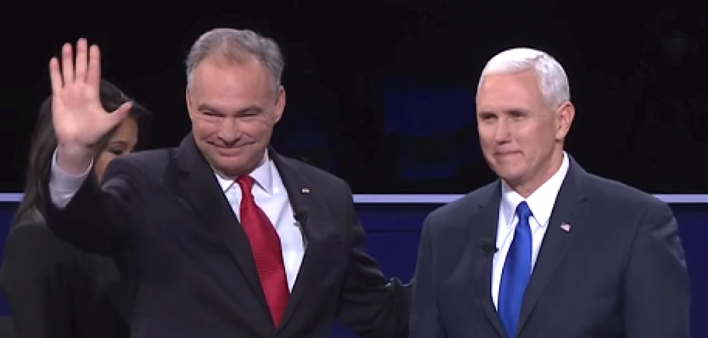Personality is important in the picking of a president, but should never be permitted to overshadow a candidate’s policies. It is very easy to become distracted by controversies and scandals over the course of a campaign, but it is only through reasoned and thorough debate of issues that the health and welfare of a functioning democracy is maintained. Unfortunately, Tuesday night’s Vice Presidential Debate kept the form of much of this election cycle, with both candidates spending much of the night focusing on the past indiscretions and errors of their opposition at the expense of productive dialogue of the planned policies of their respective administrations.
Over the course of 90 minutes, Democratic vice presidential nominee Tim Kaine and Republican vice presidential nominee Mike Pence took turns talking over one another, occasionally delving into substantive issues, but largely relegating their comments to the realm of barbed attacks and personal anecdotes well-worn from years of being used on the stump. Mr. Trump’s tax history and Secretary Clinton’s e-mails may be pertinent to their fitness to hold the office of president, but in bringing them up over and over again, the vice presidential candidates did nothing to outline what they themselves would do to address the issues facing America. Similarly, there is no doubt that the experiences that Tim Kaine had as a young man during his missionary work in Honduras and those that Mike Pence went through when he converted from Catholicism to the evangelical Protestant tradition in college had a profound effect on the trajectory of their lives, but they’re not issues that inform the voter watching at home as to what specific policies each candidate would pursue should they be elected.
With only two more presidential debates scheduled before election day, it is imperative that the presidential candidates and the debate moderators focus on providing direct and substantive responses regarding issues that matter to all aspects of the vast, multicultural, and diverse population of this nation. Among those issues, one of the most neglected has been the ways in which the candidates would address the HIV/AIDS epidemic both at home and abroad. While AIDS was mentioned during the Vice Presidential Debate, it was only done in passing as a means for Senator Kaine to publicly defend The Clinton Foundation, which has helped at least 11.5 million people in over 70 countries get affordable access to HIV/AIDS medication. At no point during Tuesday’s debate or any of this election’s previous presidential and primary debates have the candidates focused on addressing issues specific to people living with HIV.
In fact, the last time that a presidential or vice presidential debate included a question concerning HIV was all the way back in 2004, when Vice President Dick Cheney (R) and Senator John Edwards (D) stumbled through a question from PBS’s Gwen Ifill asking them how they would curb the growth of the epidemic and, more specifically, how they would address the racial disparities in HIV transmission rates. Twelve years is far too long to go without pressing presidential and vice presidential candidates in the debates to explain their HIV policies and it doesn’t take more than a quick glance at the latest statistics to see that racial disparities in HIV transmission are as glaring as ever.
Beyond that, in the years since the last time an HIV-related question was posed at a presidential or vice presidential debate, the epidemic has taken on distinct geographic disparities as well, with HIV becoming increasingly prevalent in the South and in rural areas, the very places that have failed to reap the benefits of the Affordable Care Act, including Medicaid expansion. In 2014, 8 of the 10 states with the highest rates of new HIV diagnoses were located in the South, as was the case for all of the 10 Metropolitan Statistical Areas with the highest rates of new HIV diagnoses. At the same time, nearly half of states that had rejected Medicaid Expansion and—as of January 2016—a staggering 89% of people who fall in the coverage gap between the upper limit of non-expanded Medicaid coverage and the lower limit of the ACA Marketplace premium tax credits were located in the South.
The fact is that the time is long overdue for HIV and HIV-related issues to be brought up and discussed at the Presidential and Vice Presidential Debates. This is a disease the directly impacts 1.2 million Americans and 35.5 million people all across the globe and the American people deserve to know exactly how each candidate would address the epidemic. With the sharp rise in injection drug use and the tragic HIV outbreak in Scott County, Indiana earlier this year, there has never been a better time in recent history to get serious about providing our governments and healthcare providers and communities the resources they need to end the HIV/AIDS epidemic.








Comments
Comments